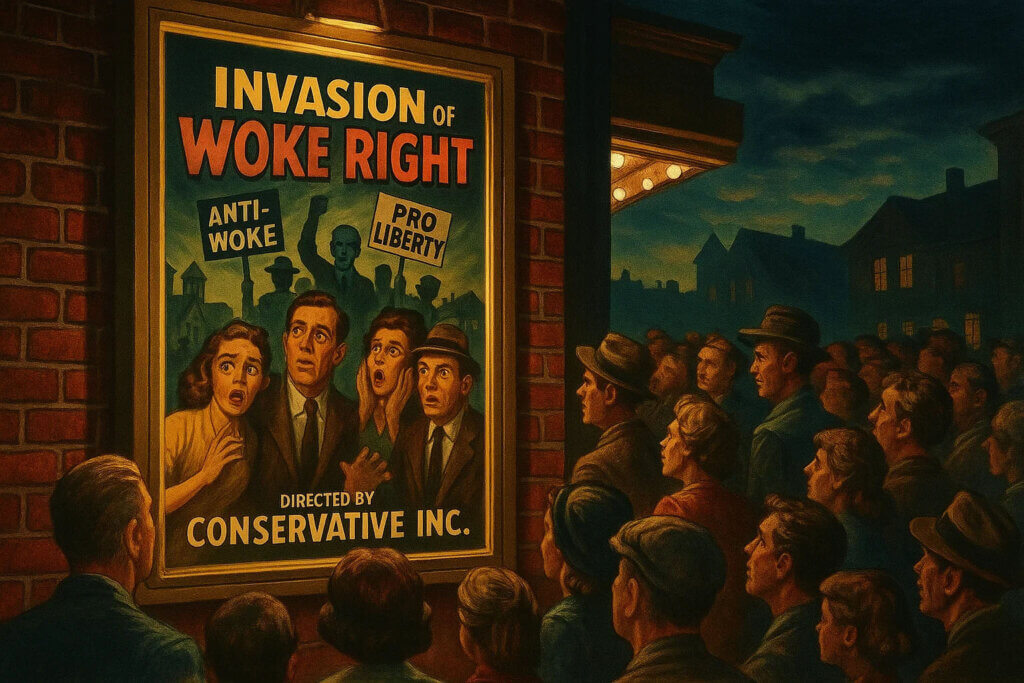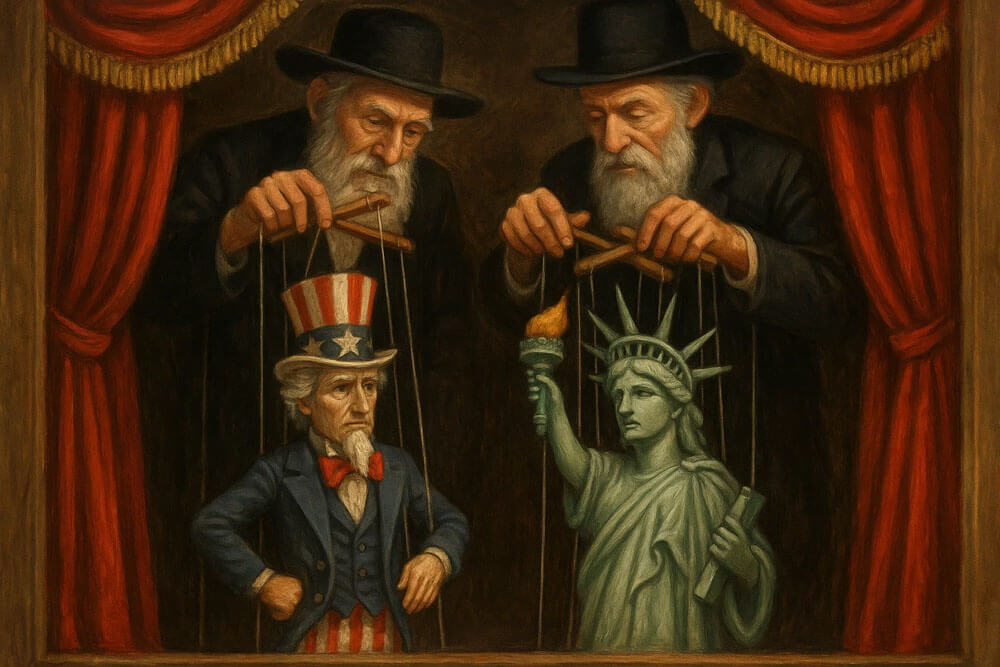Rod Dreher’s essay “The Woke Right Is Coming,” published at The Free Press, is a masterclass in condescension and cowardice—a pearl-clutching dispatch from a once-bold cultural critic now clinging to the last rung of establishment respectability. I admired Dreher’s earlier books. The Benedict Option and Live Not by Lies made sincere efforts to grapple with Western decline. But this piece? It reads like a hit job on the only generation of men still angry enough to fight for anything worth saving.
The Title Says It All
The Woke Right Is Coming for Your Sons is pure panic porn. It paints disaffected young men—mostly Zoomers—as dangerous radicals corrupting the nation’s youth, a mirror image of woke indoctrinators from the left. This false equivalence is both lazy and dishonest. These young men aren’t “woke” in any meaningful sense of the word. They’re angry because they were raised in a culture that pathologized masculinity, erased beauty, mocked tradition, and offered them porn, unemployment, debt, and antidepressants instead of purpose, identity, or family.

Instead of trying to understand these men, Dreher frames them as victims of online “radicalization,” implying parents need to intervene—as if the real danger isn’t institutional decay or mass demoralization, but bad influences online. Rather than confront the source of the despair, Dreher scolds the symptoms.
Bari Weiss’s Controlled Opposition Framing
The introduction by The Free Press founder Bari Weiss is a warning sign all on its own. Weiss isn’t a neutral publisher. She plays ideological traffic cop, allowing limited dissent as long as it stays within the lines of Enlightenment liberalism. You can question gender ideology or race politics—so long as you affirm liberal democracy and secular pluralism as untouchable.
Dreher is playing her game now. This essay reads less like something he had to write and more like something he was asked to write. It’s not his voice—it’s his audition.
Is Dreher Making His Bones?
Let’s be blunt. Dreher has had a rocky few years. He burned bridges at The American Conservative, fled to Hungary, and posted increasingly bizarre updates from exile. Even Vanity Fair took notice in its 2023 profile The Weird Journey of an American Conservative, which documented his personal, professional, and spiritual unraveling. The man needs a new institutional home.

So why not The Free Press? It has money, prestige, and a curated aesthetic of heterodoxy. Dreher knows the game. This essay smearing the “woke right” isn’t a warning—it’s an audition. He’s making his bones—not with a hit job on a rival crew, but with a hit piece on the Zoomer right. If that sounds cynical, it should. Because it fits.
No Empathy for the Forgotten Men
What’s most damning is Dreher’s lack of empathy. The young men he scorns are victims of a culture that hates them. They’ve watched their fathers emasculated, their history erased, their churches hollowed out, and their prospects destroyed. They were raised on nihilism and screens. And now, some of them are waking up—looking for hierarchy, meaning, and order.
These young men don’t need to be disciplined. They need to be understood, challenged, mentored, and called upward—not pathologized by exiled pundits with shrinking platforms and something to prove.
The “Woke Right” Fallacy
I wrote about this months ago in my piece The Woke Right Fallacy: A Tool for Ideological Gatekeeping. The term “woke right” is a rhetorical trick. It conflates anyone who rejects liberalism with the worst elements of online edgelordism. It allows legacy conservatives to tar their critics without ever engaging their ideas. It is not a description—it’s a smear. And it tells you more about the accuser’s fear than the accused’s faults.

By resurrecting a term that’s already been used by figures like James Lindsay to smear nationalistic conservatives, Dreher isn’t diagnosing a threat—he’s carrying water for the very establishment that seeks to erase meaningful right-wing dissent. It’s gatekeeping by proxy.
Even Chris Rufo Isn’t Buying It
Even Chris Rufo—no stranger to ideological combat—called out Dreher’s piece as overblown and strategically confused. In a widely circulated response on X, he wrote:
To describe what’s happening as ‘right-wing totalitarianism’ is overblown. Online shitposters are not the New Hitler; the QAnon Shaman is not going to seize the Oval Office…
It confuses, rather than clarifies, to say that ‘wokeness has migrated to the right…
The label creates a false equivalence, fails to make necessary distinctions between the two ideologies, and, in practice, makes solving the problem of woke more difficult, at the precise moment conservatives have the opportunity to make progress on it.
Rufo nails what Dreher refuses to admit: the term woke right isn’t analytical—it’s obfuscatory. It muddies the waters, smears the base, and lets the Left off the hook by pretending the sins are now symmetrical. It’s bad strategy disguised as principled alarmism.
Identity Politics Was Always Going to Come Full Circle
Since the Civil Rights Act was passed, identity politics has become the primary weapon by which non-whites assert group interests in the United States. Every grievance, every bureaucratic demand, every legislative priority—framed in terms of historical injustice and collective victimhood. Whites, we were told, must play the role of perpetual atoner, with no legitimate identity of their own. And for decades, they complied.
But history was always going to correct itself. In a world increasingly hostile to white people—where every global ill is somehow traced back to them, where Western culture is pathologized and its achievements reframed as crimes—young white men are waking up. They are realizing what every other group already knows: that in the age of tribal politics, failure to assert your identity is a death sentence.

Rod Dreher finds this frightening. He considers it beyond the pale. But it is inevitable. And for many of us, it is long overdue. The rise of white identity awareness is not a regression—it’s a response to being demonized, displaced, and deliberately marginalized in the nations our ancestors built.
Race realism—grounded in data, observable patterns, and history—is vital to understanding this moment. Jared Taylor’s work in this area has been foundational. We don’t have to adopt his every conclusion to recognize the essential truth he highlights: if whites are to survive, they must tell the truth about who they are, what they’ve built, and what they stand to lose. That’s not hate. That’s self-preservation.
Economic Displacement and Demographic Decline
Zoomer males aren’t just feeling cultural alienation. They’re seeing economic displacement in real time. Mass immigration—largely from non-white countries—has flooded Western labor markets, pushed down wages, and made housing unaffordable. And the very elites who claim to fight for “equity” are accelerating the process.
Elon Musk, for example, has publicly demanded an unlimited stream of H-1B visas from India to feed his companies’ need for cheap STEM labor. His appeals are cloaked in “innovation” rhetoric, but the reality is simpler: foreign workers are easier to exploit, and domestic young men—especially white men—are easier to discard. They don’t check enough diversity boxes. They ask too many questions.

So yes, Dreher is right that there’s growing anger. But he’s wrong to pathologize it. Because under the current regime, the Zoomer right isn’t radicalizing. It’s orienting. It’s waking up. And if that scares him, maybe he should ask why.
The Useful Idiot of the New Center
Rod Dreher, of all people, should know what it means to become a useful idiot. He’s written extensively on communism, soft totalitarianism, and the slow erosion of cultural memory. And yet here he is, being drafted into a new kind of ideological regime—not a Marxist one, but a liberal-centrist hegemony with Bari Weiss at the helm, curating dissent to preserve the system that made her.

Weiss, a Jewish lesbian married to a woman, positions herself as both outsider and gatekeeper—a self-appointed expert on antisemitism, but also on who gets to count as too extreme. Dreher’s casual invocation of antisemitism in his article—without specifics, context, or differentiation—feels less like a moral stand and more like a fealty signal. He’s not challenging the dominant power structure; he’s auditioning for protection under it.
If Dreher wants to spend the rest of his career warning parents about Bronze Age Pervert and writing for a shadow New York Times run by Bari Weiss, that’s his choice. But let’s not pretend it’s a prophetic voice crying in the wilderness. It’s a man performing for his benefactors.
Conclusion: The Gatekeeper’s Fall
There’s a reason this piece stings more than most. It’s not just the lazy arguments or the hollow moral panic. It’s the betrayal.
Rod Dreher was supposed to be one of the good guys. A man who understood the spiritual crisis of the West. A man who told Christians to resist soft totalitarianism, not collaborate with its mouthpieces. A man who knew what time it was.
But this? This is capitulation disguised as concern. This is fear in prose form. This is a man trying to stay on the guest list by turning on the people he once inspired.
Jordan Peterson is on the same unfortunate trajectory—once a lion, now a mascot for centrist respectability. Rod Dreher seems determined to follow him off the cliff.
We don’t need gatekeepers. We need guides. We don’t need more polite warnings from compromised men trying to preserve their reputations. We need courage. We need clarity. We need voices that will look this moment in the eye and say what needs to be said—even if Bari Weiss never calls them back.
Rod Dreher had a choice. He could have mentored this generation. He could have stood in the gap. But he made his bones instead.
—Wolfshead





I found your comments on Bari Weiss actually more interesting than knowing about Mr. Dreher. The title alone is pandering hard to curry favor with Free Press / Bari Weiss and similar pseudo-liberals.
I didn’t fully get why she was so popular with many, she seemed very moral, upright, so I thought she is okay.
She self-described herself as a left-leaning centrist.
And apparently doesn’t love the extremely far right.
But dumping such a load on about everyone slightly right of the conservative center is just wrong and the whole angle is stupid, as already pointed out. I already told you, I didn’t even know “woke right” is a thing, but it seems to become a new propaganda term and problem. Very leftish to confuse descriptions and meaning, just like economic migrants became “refugees” in Europe and all that…
Musk could live his values, having employees that don’t worship him (many of his Indian fans worship him more than Ganesha etc, no kidding) and don’t dance to his fiddle the very moment he lifts a finger. But I know entrepreneurs who do just the same, despite being conservatives it cannot be cheap and easy enough when it comes to their own specialist and work force. Even more important is for them the utter dependency and control they have other them. I believe I told you about a local businessman and his Turkish work force. He uses them like his personal servants and they really do everything for that guy.
I hope this woke right nonsense dies in its infancy, it’s just too stupid.
BTW, Stellar Blade is going vertical in Steam Charts, but I guess I am too old for soo much butt… ^^
But I so very much love that it makes sooo many “games journalists” squirm lol.